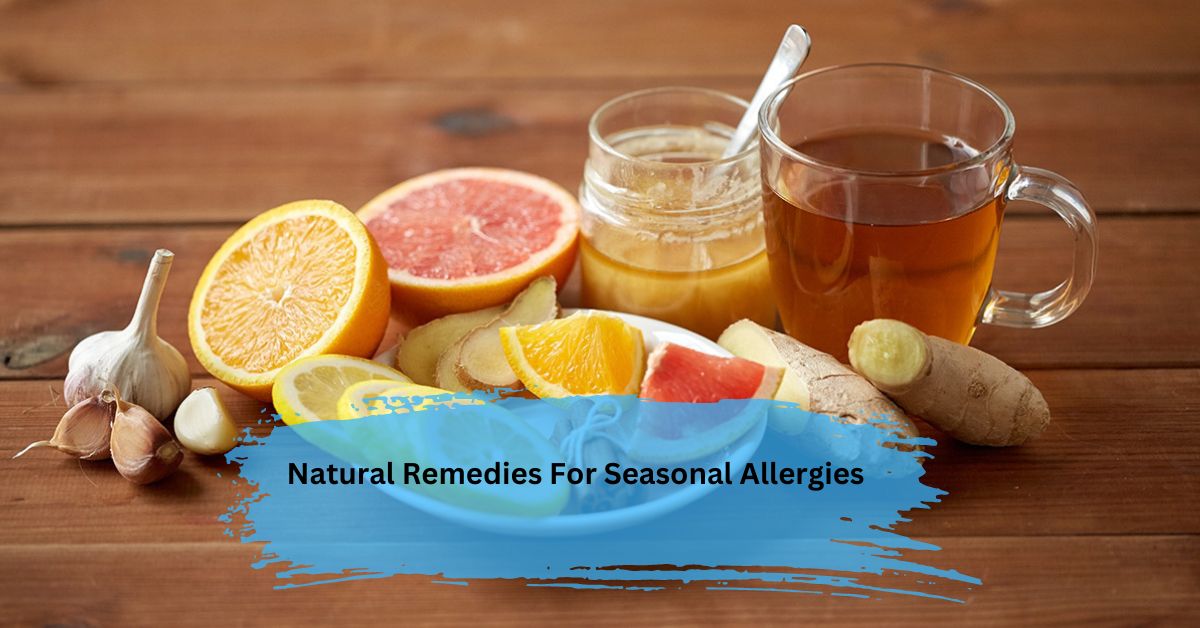Natural Remedies For Seasonal Allergies – Guide To Nature’s Shield!
As the seasons change and nature undergoes its beautiful transformations, some individuals find themselves grappling with the unwelcome arrival of seasonal allergies. The sneezing, itchy eyes, and runny nose can dampen the joy of spring and summer for many.
Seasonal allergies can be eased with natural remedies like local honey, Quercetin-rich foods (such as apples and berries), Essential oils, and many more. However, always consult with a healthcare professional before trying new remedies.
In this article, we will explore a variety of natural approaches that harness the power of nature to provide relief from seasonal allergies.
Local Honey – The Sweet Soother!
One of the most popular natural remedies for seasonal allergies is locally sourced-honey. The idea behind this remedy is that consuming small amounts of local honey, which contains traces of local pollen, can help your body build tolerance to the allergens in your environment.
While scientific evidence supporting this is limited, many individuals claim relief from their symptoms after incorporating local honey into their diets. It’s important to note that this remedy may not be suitable for individuals with severe allergies or those at risk of anaphylaxis.
Quercetin – Nature’s Antihistamine!
It is found naturally in various fruits, vegetables, and grains, quercetin is a bioflavonoid known for its anti-inflammatory and antioxidant properties. Quercetin works by stabilizing mast cells, which release histamine—a key player in allergic reactions.
Some foods that are rich in quercetin include apples, onions, berries, and leafy greens. While incorporating these foods into your diet can be beneficial, some individuals may choose quercetin supplements for a more concentrated dose.
However, It’s advisable to consult with a healthcare professional before starting any new supplement regimen.
Butterbur – A Herbal Ally!
Butterbur, is a perennial shrub found in:
- Europe
- Asia
- North America
It has been used for centuries in traditional medicine to treat various ailments, including allergies. Extracts from the butterbur plant contain compounds that may help reduce inflammation and relieve symptoms such as sneezing and nasal congestion.
However, it’s crucial to choose a reputable source for butterbur supplements, as some varieties contain pyrrolizidine alkaloids, which can be toxic to the liver. Always consult with a healthcare provider before adding new supplements to your routine.
Neti Pot – Nasal Cleansing with Saline Solution!
A time-honored practice in Ayurvedic medicine, the use of a neti pot involves rinsing the nasal passages with a saline solution to flush out irritants and allergens. This simple and effective method can help alleviate nasal congestion and reduce the frequency of sneezing.
On the other hand it’s essential to use distilled or boiled water to avoid introducing potentially harmful microorganisms into the nasal passages. Additionally, proper neti pot hygiene is crucial to prevent infections.
Probiotics – Balancing the Gut Microbiome!
Mounting evidence suggests a link between gut health and the immune system, including its response to allergens. Probiotics, the “good” bacteria that promote a healthy gut microbiome, may play a role in modulating the body’s immune response to allergens.
Fermented foods like yogurt, kefir, and sauerkraut are natural sources of probiotics. For those who prefer supplementation, a wide variety of probiotic supplements are available. As with any supplement, it’s advisable to consult with a healthcare professional to determine the right strain and dosage.
Essential Oils – Aromatherapy for Allergies!
Aromatherapy, the use of essential oils derived from plants, has gained popularity as a natural remedy for various health concerns, including allergies. Essential oils such as peppermint, eucalyptus, and lavender are believed to have anti-inflammatory and decongestant properties.
Diffusing these oils or adding a few drops to a carrier oil for topical application may provide relief from nasal congestion and respiratory symptoms. However, it’s important to use essential oils with caution, as they can be potent, and some individuals may be sensitive to certain oils.
Stay Hydrated And Maintain A Healthy Lifestyle – Way To A Happy Life!
While specific remedies can offer relief, maintaining overall health and well-being is key in managing seasonal allergies. Staying hydrated helps thin mucus and soothes irritated nasal passages.
Additionally, adopting a healthy lifestyle that includes:
- Regular exercise
- Sufficient sleep
- Balanced diet can contribute to a robust immune system, reducing the severity of allergy symptoms.
Here you go! These remedies will assurely helps to prevent you from seasonal allergies and enjoy every season happily.
Frequently Asked Questions:
Can consuming local honey really help with seasonal allergies?
Yes, local honey is believed to help build tolerance to local pollen, potentially reducing allergy symptoms.
What precautions should be taken when using butterbur supplements?
While butterbur extracts may help reduce inflammation and allergy symptoms, it’s essential to choose a reputable source, as some varieties contain pyrrolizidine alkaloids that can be harmful to the liver. So always consult with your doctor.
Can probiotics genuinely help in managing seasonal allergies?
Mounting evidence suggests a connection between gut health and the immune system’s response to allergens. Probiotics, found in fermented foods like yogurt and sauerkraut, may play a role in modulating the immune response.
Conclusion:
Seasonal allergies need not cast a shadow on the beauty of changing seasons. Embracing natural remedies provides individuals with alternative options for managing allergy symptoms, often without the side effects associated with conventional medications.
By tapping into the healing power of nature, individuals can find relief and enjoy the wonders of each season without the burden of allergic discomfort.







